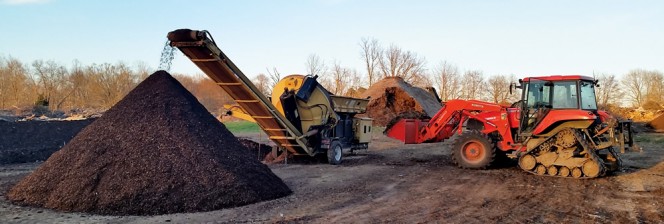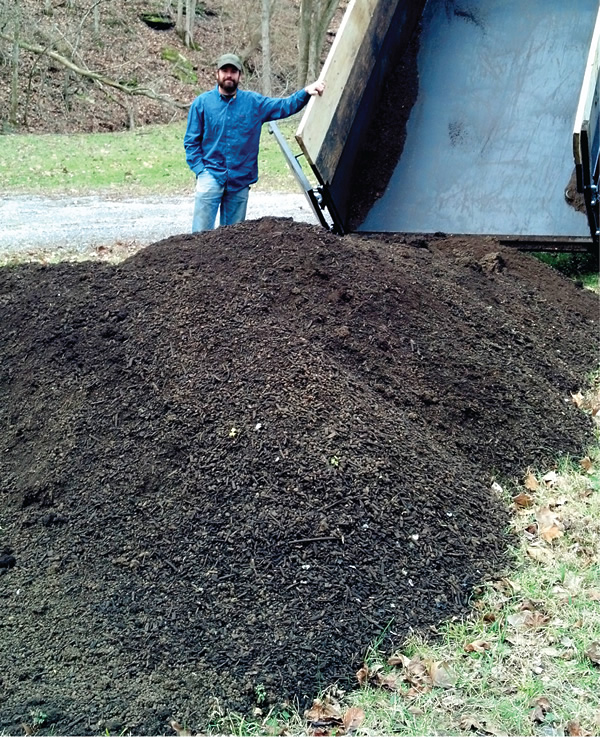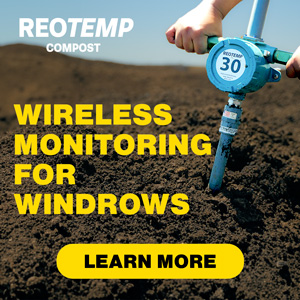Dan Emerson
BioCycle October 2015

The Compost Company occupies a 37-acre site in rural Cheatham County. Composted mulch is shown being screened.
In 2011, Edward Wansing launched the Compost Company in Ashland City, Tennessee, the first organics recycler in the mid-state region around Nashville. Wansing, who grew up on a farm and pursued a career in sustainable architecture, saw a need for recycling of organic waste in the growing Nashville area. “Before I started the company, I spent a number of months talking to area waste haulers and recyclers, to gauge local interest,” he explains.
Wansing also contacted several area municipalities, tree trimmers and line clearing contractors to line up sources of carbon in the form of tree and yard trimmings. Today, Compost Company has contracts to receive wood waste from the city of Clarksville, one major contractor (ABC Tree) and a number of smaller firms. The Compost Company also had been receiving mostly preconsumer produce from a local Walmart and Sam’s Club. Over time, however, preconsumer produce waste has become less available as a composting ingredient, with more of it being used for animal feed by local farmers.
“We have been diversifying our feedstocks by implementing our own hauling service and expanding into new areas,” Wansing notes. “We are becoming more independent of the larger waste haulers, to better control our supply of incoming feedstock.” The Compost Company found interest among several large generators, including the Music City Center convention facility (which generated an estimated 8 tons of organic waste last year, according to the Center’s annual report), along with several Nashville office buildings and food processors. It also services hotels and conference centers that host events producing large amounts of postconsumer food and paper packaging and serving waste, as well as compostable bioplastic serviceware.
Collection, Composting Logistics
The Compost Company utilizes a Dodge Ram truck with a dump trailer to service collection routes. It recently added a roll-off trailer and Baker Waste Equipment 10- cubic yard (cy) sealed roll-off containers. The company composts between 700 and 1,000 cy/month of organics, including food waste and lawn and landscape trimmings. Additional generators in the Nashville area are being added continually, primarily diverting food waste and compostable paper. “We’ve been getting a lot of calls from people who find us through BioCycle’s FindAComposter.com® and our US Composting Council member listing,” Wansing says.
As the only large-scale composting facility in middle Tennessee, The Compost Company has been benefiting from the growth of the local food movement in the Nashville area. “We’ve been seeing a lot of new restaurants and transplants moving here who are interested in sustainability and organics recycling,” he adds.
The Compost Company occupies a 37-acre site in rural Cheatham County, northwest of Nashville. Its compacted clay composting pad has room for more than a dozen windrows, generally 12-feet wide, about 6-feet high and ranging from 75 to 225 feet in length. During the early stage of composting, piles are turned twice weekly (depending on the feedstock mix) “to get it into the active phase and increase the air moving through it,” Wansing explains. Turning becomes less frequent as piles mature. Weather is also a factor. “It cooks a little faster in the summer,” he continues. “In the winter, the piles still heat up, but we have to keep them covered and work a little harder to keep them dry.”
Curing time ranges between four months (for finer material with less wood waste) up to 12 months for compost with more wood content. “We add well aged mulch to one of our products toward the end of the curing phase to increase the fungal activity,” Wansing notes. Finished compost is screened to one-half inch using an Orbit Model 68 screen. A three-quarter-inch screen was tried, but uncompostable plastic material passed through, making that size unworkable. Other equipment used in the composting operation includes a Kubota tractor/loader, an Earthsaver Equipment compost turner, and a Duratech HD 10 tub grinder.
The Compost Company’s premium compost is made from wood chips, leaves, tobacco-growing residuals and postconsumer food waste. The product line also includes Secret Blend compost, composted mulch, natural hardwood mulch and compost tea. The composted mulch has the same ingredients as the premium screened blend, but twice as many wood chips. A Carry-On HDX dump trailer is used for end product deliveries.

Most compost is sold in bulk, and some in 1- and 2-cubic foot bags. With growing demand for locally grown produce, sales to farmers have been on the upswing.
The Compost Company’s marketing area reaches approximately a 100-mile radius, extending into Kentucky. Most compost is sold in bulk, and some in one and two-cubic foot burlap bags. Some retailers prefer plastic bags for ease of handling, but burlap is better for allowing the material to “breathe,” Wansing notes.
Bulk deliveries are provided for homeowners in the area. “On the consumer side, people come to us for guidance on which of our blends are best for what they are doing, such as growing in raised beds and using compost as top dressing for their lawn,” he adds. With the growing demand for locally grown fruits and vegetables, sales to produce farmers have also been on the upswing.
Wansing says he’s found the composting business to be a constant process of learning and adjusting. “For example, we learn something every day about better ways to mix our feedstocks for composting,” he explains. “All food waste is mixed with wood chips with the loader, then run through the tub grinder to create a well mixed blend with smaller particle sizes to speed up the process. As much as we try to standardize, every mix is going to be a little different based on what materials we take in. The most important thing is being able to watch the moisture content and temperature and let the pile tell you what it needs. So, we measure what the pile is doing and adjust accordingly.”
After four years, the four-employee composting operation is making a small profit, most of which is reinvested in the business, Wansing notes. “We’re still growing rapidly, but along with growth comes additional costs.” He expects to sell about 1,000 cy of compost this year, up from about 700 to 800 cy in 2014.
Dan Emerson is a Contributing Editor to BioCycle.













